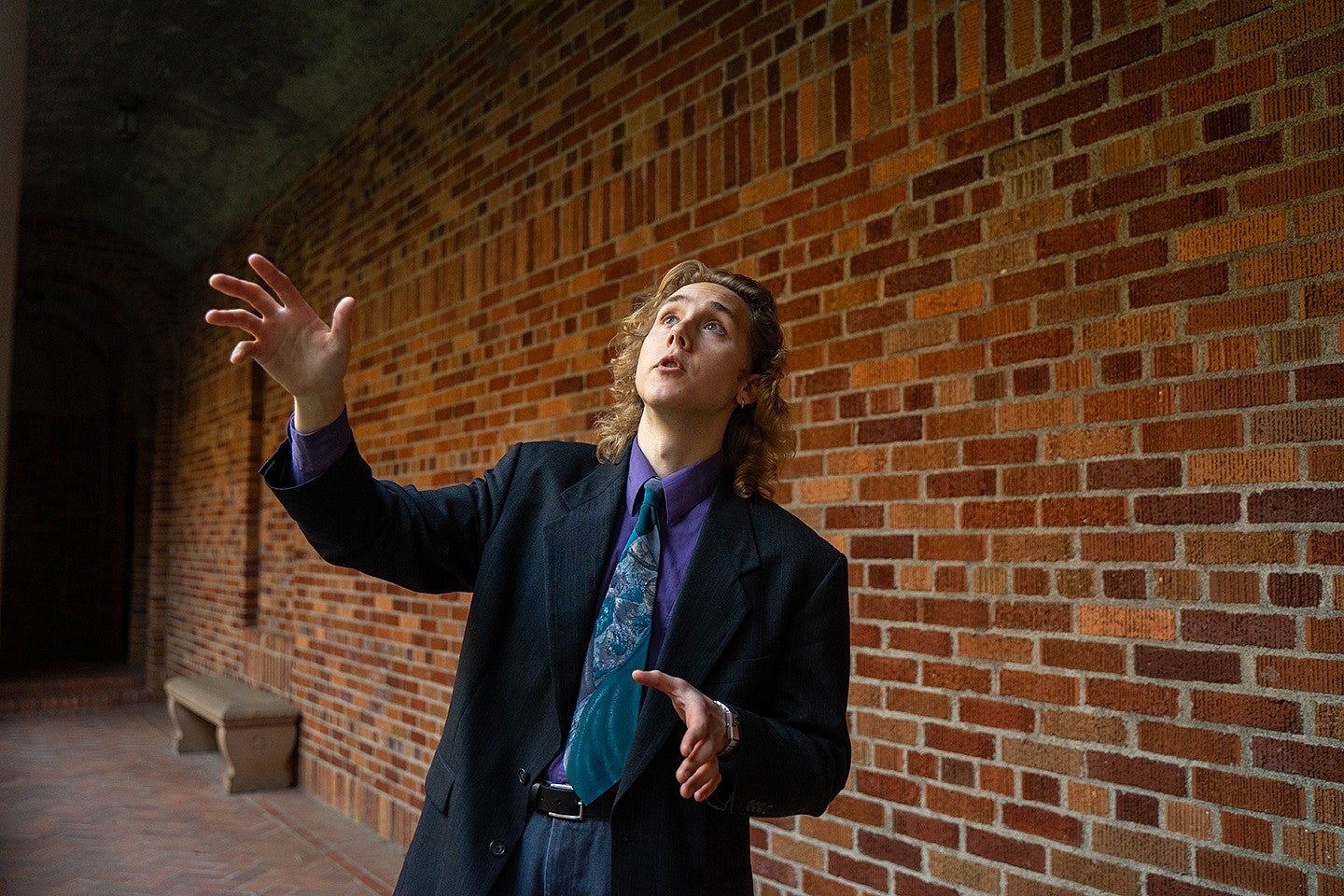
"Why am I knowing this?"
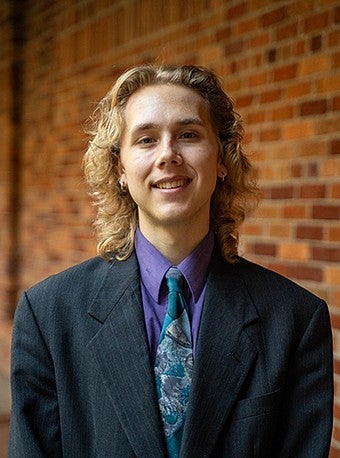
Year in school: Junior
Major: Anthropology and Sociology
Coffee or tea: Coffee, absolutely nothing added to it and as strong as possible.
Favorite CHC class: HC 221 - Narratives of Retribution/Revenge with Ulrick Casimir
Song on repeat: “The Only Living Boy in New York” by Simon and Garfunkel
Role model: My parents, consistently.
Advice for other students: Take the chance to reach out to professors whose research interests you and don’t be afraid to be persistent.
Dylan Podrabsky sat at a table in a temporary shelter across from a woman who was homeless. As part of the UO’s Homelessness Policy and Health research group, he was there to gather general information about how living unsheltered affected her.
Volunteers passed around plates of hot food as he spoke to her. She declined each offering. That’s when it struck Podrabsky, a Clark Honors College junior, that he shared a connection with the woman who was in crisis. Like him, she said she was allergic to the food being served.
“Think about the types of foods people offer to homeless people,” she said to him. “Sandwiches, packaged chips. I can’t eat any of that. I can take lettuce off of sandwiches, but I can’t wash it off. I go days without eating. I feel constantly hungry.”
Podrabsky, who is majoring in anthropology, thought back to the many times when he went out with friends or family members. His stomach would grumble as he declined to eat, worried that something would be in a dish that caused him to have a reaction. But unlike the woman he interviewed, he could go home and make himself a meal.
“I saw how my own vulnerability plays out directly in this situation,” he recalled. “The place I occupy is so privileged, and I couldn’t forget how her story could so easily be mine.”
Podrabsky’s work with the research group has helped him gain skills and also learn about how physical and mental health conditions impact the lives of poor populations who face homelessness.
In the group run by Jo Weaver, a UO associate professor of global studies, Podrabsky and his colleagues conduct a combination of spoken life history interviews and gathering traditional biological markers of stress as part of their research.
He is using the research to support his senior thesis next year. And he has already presented some of it at a recent Society for Applied Anthropology meeting last month.
For an issue as isolating as homelessness, Podrabsky sees having empathy as a critical component to solving the problem. And he credits the CHC with having an impact on him and other students.
“Every class I’ve taken at the CHC challenged how I understand the world,” he says. “It encourages me to question the unquestioned relationships.”
Podrabsky was born in Portland, the only child of Jason and Tracy Podrabsky. Both his parents have backgrounds in biology.
When he was six months old, Podrabsky’s parents fed him solid food for the first time. He responded by swelling up and going into anaphylactic shock. From that day on, he’s lived his life knowing that he was allergic to a number of foods.
He remembers as a kid going to friends’ birthday parties carrying homemade pizza with the earliest versions of vegan cheese. They’d find just the right kind of coconut ice cream that he could handle.
“When so many ‘normal’ things pose such a danger to you, you have to learn how to watch and observe what people are likely to do,” he recalls.
His parents, two academics, cultivated a love of learning and a passion for science in their child. His father often took a young Podrabsky with him to his job as a biology professor at Portland State University, and the two of them would stop and observe the whale skeleton that hung from the ceilings of one of the research buildings.
He would go on hikes with his mother, who conducted biological research in her job. They’d go on walks around the Tryon Creek State Natural Area, and he learned to identify plants and animals.
At age five, Podrabsky played Captain Hook in the play “Peter Pan,” and his mother Tracy gushes at how he took to performing. “He told me once about performing, ‘Mama, it makes my heart feel alive,’” Tracy recalls.
When Podrabsky was eight, his mother was diagnosed with breast cancer. “I remember thinking, ‘Why am I knowing this?’” He quickly came to understand it would have hurt and confused him more to watch his mother battle something he couldn’t name.
“Sometimes you hear things that you don’t want or know, or that hurt you or, remind you of painful things,” he says now. “But that does not deny the power of it, and in some ways that really is the power of it. That you (learn to) listen.”
When his mom went into remission a little over a year later, he opened up after her oncologist handwrote him a note, thanking him for all the great care he took of his mother.
“Dylan takes on a lot of other people’s stress and pain,” his mom says. “He’s so empathetic, and we’re so lucky to share space with him.”
He recalls walking through the streets and parks of Portland, seeing people with backpacks and tents. He wondered why people didn’t have shelter and why none of the authority figures he knew were doing anything about it.
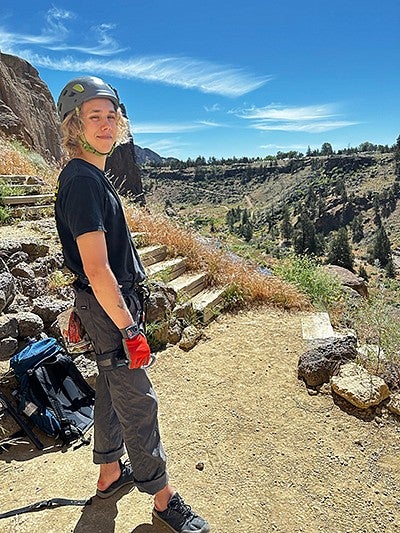
At Southridge High School, Podrabsky was president of the Thespian Society and a committed student. One of his teachers encouraged him to take an advanced anthropology course. It struck a chord with him.
“My draw to anthropology comes from my desire to feel seen and understood as someone who operates differently than the majority,” he says.
In the halls of Chapman, you’ll more often than not find Podrabsky wearing a button-up shirt and suit jacket. “In high school there's so much pressure to fit in, but I kind of realized I didn’t want to,” he says. “And I always liked how I felt when I wore a button-up or nice suit.”
Podrabsky, who uses both he and they pronouns, says the CHC has given him the opportunity to meet peers who similarly wanted to do research and have a career in academia.
Working with Weaver and her group has allowed Podrabsky a chance to work with like-minded people. And it was early on that he noticed that Eugene had a sizeable homeless population.
He first met Weaver during his first year when she lectured in an anthropology class he was taking. He approached her afterward and asked if she needed a research assistant and she hired him.
Podrabsky’s initial role was to clean transcriptions from Weaver’s previous interviews with members of the homeless community, government service providers and people from neighborhood associations. He stuck with it. The research helped gather the data for “Co-opting the ‘Public’ in Public Health: Homelessness and the Specious Logic of Discretionary Displacement in a Mid-Sized US City” written by Weaver, Claire Herbert, Podrabsky, and McKenzie L Ní Flainn. It was published in January 2025.
After the pilot program, Weaver asked Podrabksy to stay on the project for which they received four years of funding from the National Science Foundation. He started with short-form interviews and questionnaires for people living unsheltered, in temporary shelters, and in permanent supportive housing.
He remembers a transformative moment at the CHC from about a year ago during his sophomore year. He had been interviewing some homeless people for research as rain poured down and temperatures had plummeted below freezing. Afterwards, he bicycled to Chapman Hall for a class.
When he entered the building, he was soaking wet. Someone asked him if he was OK.
At that moment, he reflected on his work with the homeless. The people he was interviewing on the street didn’t have the luxury of sitting in a warm classroom, nor the expectation that others would greet them, check in with them and listen to them if they were in crisis.
“That solidified (for me) the need for any research to be applied,” he says now. “Because if things are just existing in the abstract, they’re just in the abstract. It doesn’t matter to the people who are actively hurting. There’s also the absolute necessity of applied research and in making sure that your research is not harming people. At the bare minimum, to make sure that if you can, it is helping.”
“Our stories are much more entangled with each other than we ever think. And I think that that gives us a responsibility to at least listen, at least recognize the shared humanity of those around us.”
Last summer, Podrabsky worked closely with Mae Sowards, a doctoral student, and Claire Herbert, a UO associate professor of sociology who teaches in the Honors College. They spent hours talking to people, conducting “life history interviews” with the homeless, he says.
Sowards says she liked working with Podrabsky. “We weren’t reaching people in sheltered situations, so Dylan and I just started going places we knew folks were hanging out,” she recalls. “We’d hand out water and Gatorades and just listen,” says Sowards.
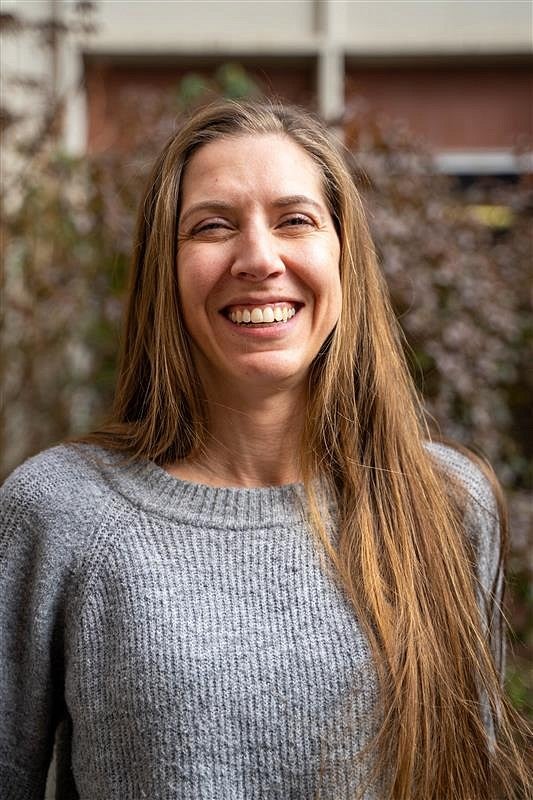
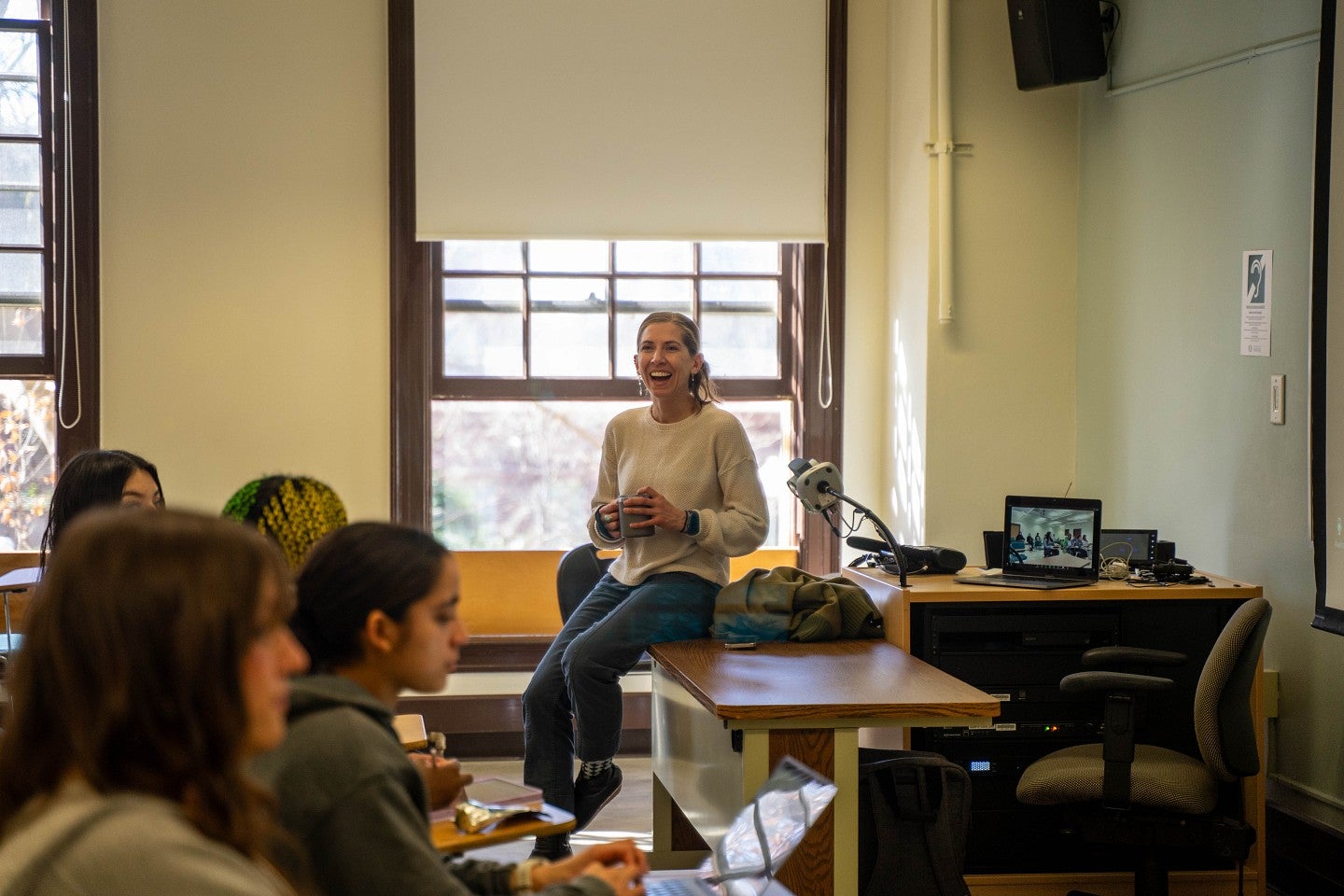
Herbert has taught the course HC 431: Housing and Homelessness, a course that addresses the stigmatization faced by many homeless people. She says that sometimes she finds some students are closer to homelessness than people might think. “It’s really important we feel those emotions,” she says.
Podrabsky thinks his work on the issue has made a difference. He recalls the time earlier in the year when he walked into a Safeway store and encountered a man who was carrying a tub of laundry detergent. It was someone that he had interviewed before when he was homeless. He had found shelter and was doing OK.
“Our stories are much more entangled with each other than we ever think,” Podrabsky says. “And I think that that gives us a responsibility to at least listen, at least recognize the shared humanity of those around us.”
